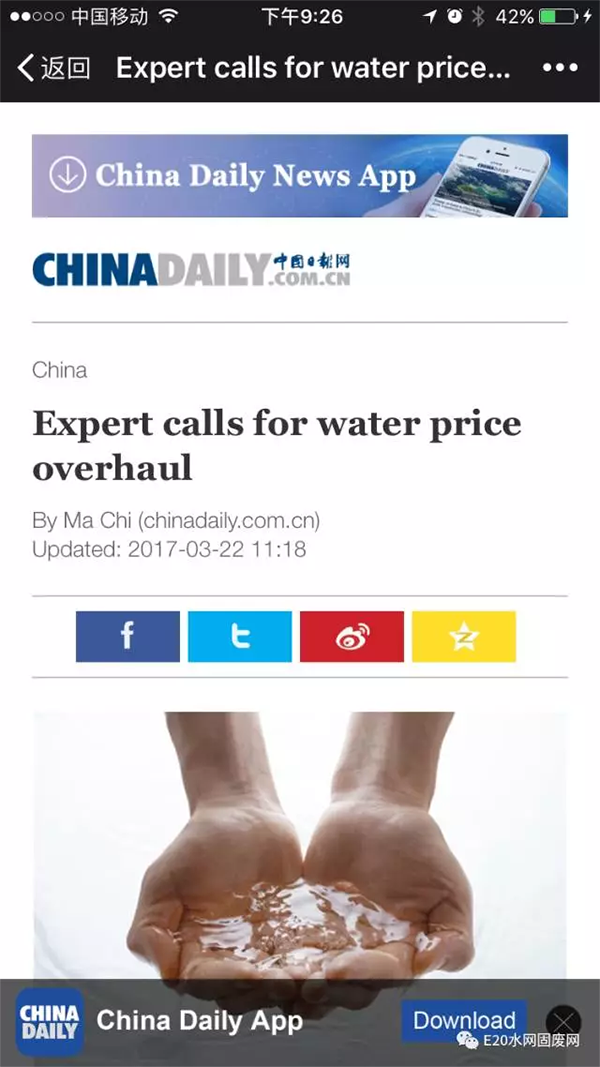时间: 2017-03-27 14:49
来源:
作者: 薛涛
人类可以通过技术来改变生态环境恶化的现状吗?
大的历史维度上,人类对自然的影响是不可逆的。我们所说的生态,实际是“人的生态”,是“仿生态”。科技的进步会促进“仿生态”的实现,未来的世界会保留一些像自然状态的小区域。技术的进步会使资源利用的效率提升,但是资源利用的强度只会越来越强。科技的进步可以使人可以和自然共存,但是不能回到真正的自然状态。

Expert calls for water price overhaul
By Ma Chi (chinadaily.com.cn)
Updated: 2017-03-22 11:18
The current pricing system is hampering the formation of a water-saving culture in China, according to E20 Environmental Platform, an environmental protection services platform.
In China, a large portion of the water price is paid by the government, rather than the users, said Xue Tao, the deputy head of E20.
Xue said that means the general public have little awareness of the scarcity of water and leads to rampant waste.
The pricing system also stands in the way of introducing alternative water resources such as reclaimed water and desalinated sea water as users are reluctant to pay a reasonable share for what has been a public service for a long period.
"It is unfair that polluters do not bear the environmental cost while those who save water do not get any benefits," Xue said.
The same rule applies in industrial water use, he said.
"It is imperative that environmental cost is added into the production cost to increase water use efficiency."
The challenge is to upgrade the industrial sector and phase out water-intensive production, a task the government cannot perform alone and requires market forces.
A regional gap is seen in renovating the industrial sector, Xue said.
In coastal regions, such as the Yangtze River Delta and Pearl River Delta, where a large number of talents gather and high standards in environmental protection are established, the industrial sector has been largely renovated and upgraded.
It is a different case in regions such as Hebei province where traditional industries are losing momentum while new industries have not yet been established. This is related to the region's cultural and natural environments, appeal to talents, and the services provided by government.
Although home to two of the world's longest rivers, Yellow River and Yangtze River, China's fresh water resource per capita is only one quarter of the global average, according to the Ministry of Water Resources.
And the fresh water resources are unevenly distributed, with more than 80 percent in the south. In 2014, over half of the country's 600 cities faced water shortages, with more than 100 severely lacking water.
To quench the thirst of these cities, water diversion projects such as the South-to-North Water Diversion Project, have been built.
(来源:中国日报“说天下”专栏;发布时间:2017年3月23日)
编辑: 赵凡

目前在中国科学院生态环境研究中心攻读博士学位,此前分别在武汉大学和北京大学光华管理学院获得理学学士和工商管理硕士学位。
现任E20环境平台执行合伙人和E20研究院执行院长,湖南大学兼职教授,华北水利水电大学管理与经济学院客座教授,中科院生态环境研究中心硕士生校外导师,天津大学特聘讲师,并兼任北京大学环境学院E20联合研究院副院长,国家发改委和财政部PPP双库的定向邀请专家,世界银行和亚洲开发银行注册专家(基础设施与PPP方向)、国家绿色发展基金股份有限公司专家咨询委员会专家库专家、巴塞尔公约亚太区域中心化学品和废物环境管理智库专家、中国环保产业研究院特聘专家、中国环保产业协会环保产业政策与集聚区专业委员会委员。住建部指导《城乡建设》杂志编委、《环境卫生工程》杂志编委、财政部指导《政府采购与PPP评论》杂志编委,并担任上海城投等上市公司独立董事。
在PPP专业领域,薛涛现任清华PPP研究中心投融资专业委员会专家委员、全国工商联环境商会PPP专委会秘书长、中国PPP咨询机构论坛第一届理事会副秘书长、生态环境部环境规划院PPP中心专家委员会委员、国家发改委国合中心PPP专家库成员、中国青年创业导师、中央财经大学政信研究院智库成员、中国城投网特聘专家等。
20世纪90年代初期,薛涛在中国通用技术集团负责世界银行在中国的市政环境基础设施项目管理,其后在该领域积累了十二年的环境领域PPP咨询及五年市场战略咨询经验,曾为美国通用电气等多家国内外上市公司提供咨询服务,对环境领域的投融资、产业发展和市场竞合格局有着深刻理解;2014年初加入E20研究院并兼任清华大学环保产业研究中心副主任,着力于环境产业与政策研究、PPP以及企业市场战略指导等方向。
